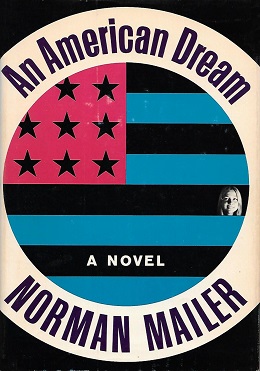An American Existential Nightmare-Norman Mailer’s An American Dream
Book Review
From The Pen Of Frank Jackman
An American Dream, Norman Mailer, Vintage International, 1999
Writers, American writers have since the beginning of the Republic, maybe before, attempted to tackle the question of what the American Dream of prospects, prosperity, and promises looked like to their time. Obviously in times of social stress (like now) that dream looked pretty ephemeral, looked like chasing after rainbows. Okay, let’s be blunt a rather raggedy dream. For other generations writers have acted as advance men and women for the “streets paved with gold” idea of what the democratic social experiment started over two centuries looked like to them. The book under review, Norman Mailer’s American Dream, was written during a time of social stress in the 1960s and reflects that rather ambiguous former take on the dream. Actually maybe in Mailer’s case he was part of the disruption with his campaign for Mayor of New York and his anti-war writings, and perhaps he liked to think of himself that way. An avenging warrior against the night-takers, then (and now still with us).
Book Review
From The Pen Of Frank Jackman
An American Dream, Norman Mailer, Vintage International, 1999
Writers, American writers have since the beginning of the Republic, maybe before, attempted to tackle the question of what the American Dream of prospects, prosperity, and promises looked like to their time. Obviously in times of social stress (like now) that dream looked pretty ephemeral, looked like chasing after rainbows. Okay, let’s be blunt a rather raggedy dream. For other generations writers have acted as advance men and women for the “streets paved with gold” idea of what the democratic social experiment started over two centuries looked like to them. The book under review, Norman Mailer’s American Dream, was written during a time of social stress in the 1960s and reflects that rather ambiguous former take on the dream. Actually maybe in Mailer’s case he was part of the disruption with his campaign for Mayor of New York and his anti-war writings, and perhaps he liked to think of himself that way. An avenging warrior against the night-takers, then (and now still with us).
The early 1960s produced a certain view of success, home, hearth, health, spouse, kids, maybe a stray dog thrown all the time keeping your head down (“nose to the grindstone” a lot of people called with some pleasure) in the main which is what a lot of us, including avenging angel Mailer, were fighting against but that view, and those who espoused success by the amount of celebrity as now, have won out in the ethos of the times battle. Or at least this round.
Celebrity is what allowed the protagonist here, Steve Rojack, to think he could get away with murder, in this case the murder of his wife by his hand. Murder in an alcoholic rage. Of course if that was all that it was there would be a pretty thin plot. So Rojack denied having anything to do with it, had in any case staged the murder to look like a suicide (dropping his lovely high society wife out a big old New York apartment house window). And if he could not brazen it out he would have been more than happy to find a convenience fall-guy because guys who are celebrities don’t figure to work their act well in a prison setting, or waiting around for the big step-off that comes with a capital case like murder in many states.
It is that tension, that thrill of the possibility of getting away with the dastardly deed, putting his wits against the New York police who are on to him, some serious underworld bad guy types and his now ex-wife’s father’s machinations which drives the rest of the story. Naturally with the trademark Mailer twenty-nine varieties of sexual encounters, some of them rather strange by conventional literary standards then, some off-hand musing about the fate of modern humankind and its views on success, at least in the West, and another choice story line tinged with the existential philosophy and situations that Mailer picked up from the Europeans and made a hallmark of his writing in the 1950s and 1960s. Not Mailer’s best of his thirty some works and a novel that caused a firestorm in feminist circles later (and rejoinders by him) but a good read about the tenor of those times.

No comments:
Post a Comment